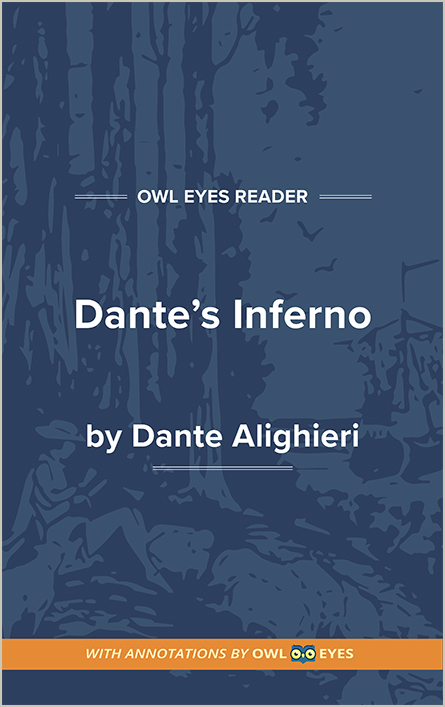Analysis Pages
Facts in Dante's Inferno
Facts Examples in Dante's Inferno:
Canto 1
🔒"O happy those, Whom there he chooses..." See in text (Canto 1)
"I do beseech thee (that this ill and worse I may escape) to lead me, where thou saidst, That I Saint Peter's gate may view, and those Who as thou tell'st, are in such dismal plight..." See in text (Canto 1)
"The hour was morning's prime,..." See in text (Canto 1)
Canto 2
🔒"O courteous shade of Mantua..." See in text (Canto 2)
"Since three maids so blest..." See in text (Canto 2)
Canto 3
🔒"THROUGH me you pass into the city of woe..." See in text (Canto 3)
Canto 9
🔒"The place is all thick spread with sepulchres..." See in text (Canto 9)
Canto 11
🔒"the Wain..." See in text (Canto 11)
"The Pisces play..." See in text (Canto 11)
"Cahors..." See in text (Canto 11)
Canto 12
🔒"that old rock toppled down..." See in text (Canto 12)
Canto 14
🔒"Cocytus..." See in text (Canto 14)
Canto 15
🔒"Along the Brenta..." See in text (Canto 15)
"As the Flemings rear Their mound, 'twixt Ghent and Bruges, to chase back The ocean..." See in text (Canto 15)
Canto 16
🔒"Acquacheta..." See in text (Canto 16)
"Apennine..." See in text (Canto 16)
"mount of Vesulo..." See in text (Canto 16)
Canto 20
🔒"Benacus then no more They call the name, but Mincius, till at last Reaching Governo into Po he falls..." See in text (Canto 20)
"Benacus..." See in text (Canto 20)
"Carrara's hind..." See in text (Canto 20)
"Thus one perhaps Hath been by force of palsy clean transpos'd..." See in text (Canto 20)
Canto 21
🔒"Serchio's wave..." See in text (Canto 21)
Canto 30
🔒"Swoln dropsy..." See in text (Canto 30)
"Much more than the disease, which makes the flesh Desert these shrivel'd cheeks..." See in text (Canto 30)

